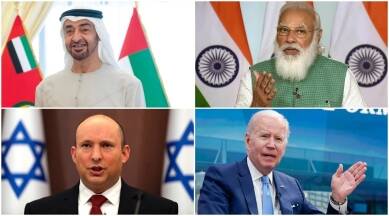On 14 July 2022, the leaders of India, Israel, the United States (US) and the United Arab Emirates (UAE) held the first summit meeting of a new ‘mini-lateral’ grouping called ‘I2U2’. This was a continuation of the process started in October 2021 when the foreign ministers of the four countries held a quadrilateral meeting during the visit of External Affairs Minister Dr S. Jaishankar to Israel. While Yair Lapid, then Israeli foreign minister, and Jaishankar attended the meeting in person, US Secretary of State Antony Blinken and UAE Foreign Minister Abdullah bin Zayed joined virtually and decided to launch a new quadrilateral forum for “expanding economic and political cooperation in the Middle East and Asia, including through trade, combating climate change, energy cooperation, and increasing maritime security”.
By Md. Muddassir Quamar
The new quadrilateral forum was again discussed during the India–US 2+2 meeting in Washington in April 2022 that “welcomed the opportunity to enhance engagement” among the four countries “on shared priorities such as food security, clean energy, waste management, and infrastructure development”.
The launch of the I2U2 is significant for several reasons. Foremost, it indicates a synergy among the four countries prioritising a cooperative mechanism to address issues of human security of the Middle East region. Hence, the grouping puts matters such as water, energy, transportation, space, health, and food security at the forefront. Broadly, the focus of the mini-lateral initiative is to harness the strengths of the four countries to develop unique solutions for challenges facing the region through geo-economic cooperation.
The new grouping also has implications for regional politics and the interactions between regional and international powers. It advances the spirit of the Abraham Accords signed in September 2020 to what has been referred as an “Indo-Abrahamic” alliance. This means cooperation among like-minded regional and international powers developing cooperative mechanisms for a win-win solution to problems facing them and the region. From Indian foreign policy perspective, the I2U2 represents the broadening of New Delhi’s growing engagement with the Gulf and Middle East under Prime Minister Narendra Modi, besides signalling the growing scope of India’s strategic cooperation with the US, Israel and the UAE.
Prioritising Human Security
At the core of it, the I2U2 is about geo-economics and human security. The Middle East region has certain unique features including a young demography and abundance of natural resources, especially fossil fuels and minerals, but also suffers from perennial problems due to geopolitical and socio-economic challenges as well as vulnerabilities to climate change and environmental insecurity. Consequently, the region has witnessed conflicts and wars over the past decade including in Lebanon, Iraq, Syria, Libya and Yemen, resulting in unprecedented destruction and humanitarian crises.
The conflict-ridden countries have also proved to be fertile grounds for the rise in radicalism, extremism and terrorism. Concurrently, the region faces extraordinary socio-economic and political challenges, including poor economic growth, unemployment, corruption, crony-capitalism, bad governance and authoritarianism. There is also a notable disparity in economic and human development within and among the regional countries. While the oil-rich Gulf Cooperation Council (GCC) States and Israel score highly on human development indices, others lag behind.
In the decade since the 2010 Arab Spring uprisings, the region has suffered extraordinary human insecurity due to conflicts and poor economic performance. Any hopes for cooperation among regional countries to overcome challenges to human security have been nullified by geopolitical tensions and rivalries. In this context, the I2U2 provides a new template for cross-regional cooperation to address human security issues. I2U2 prioritises geo-economics and underlines the need for bringing regional and international powers together to pave ground for cooperation in trade, business, infrastructure development, connectivity and finding scientific and technological solution to problems pertaining to food, water, energy and health security.
The four I2U2 countries bring together unique strengths that can generate the required momentum for prioritising human security. The US is not only a leading global military power but continues to be a financial and technological leader in the world. It is also the preeminent international actor in the Middle East both in terms of its diplomatic and strategic influence and economic interdependence with regional countries.
India, on the other hand, is a leading Asian and an emerging global power that has strong and historical relations with the Middle Eastern countries. The size of its economy and demography accrues it advantages, especially as a market and investment destination. Further, India has prioritised harnessing its demographic dividend towards expediting economic growth and human development.
The UAE and Israel are two important regional powers that despite their smaller size are key actors in regional politics. The UAE is an economic powerhouse because of its ability to transform itself into a regional and global business hub transitioning into a post-oil economy and setting an example for others. Additionally, the unique amalgamation of hydrocarbon resources and investments in clean and green energy technology puts the UAE at the forefront of international energy market. Finally, Israel brings scientific and technological expertise that has put it on the map of tech start-ups extending unique solutions to problems such as water management, irrigation, farming and waste management.
The first summit meeting of the I2U2 announced two initiatives focused on addressing pressing global concerns on food security and clean energy. The first pertains to food security wherein the UAE committed to invest US$ 2 billion in development of “a series of integrated food parks across India” with “state-of-the-art climate-smart technologies to reduce food waste and spoilage, conserve fresh water, and employ renewable energy sources”. Accordingly, it was agreed that “India will provide appropriate land for the project and will facilitate farmers’ integration into the food parks” while the private sector in the US and Israel will join by offering innovative scientific and technological solutions to make the initiative successful.
The other project announced after the meeting pertains to clean energy. The I2U2 plans to set up a “hybrid renewable energy project” in Gujarat “consisting of 300 megawatts (MW) of wind and solar capacity complemented by a battery energy storage system”. The project is worth US$ 330 million on which the feasibility study was conducted by the US Trade and Development Agency and the intention is to bring private sector from the four countries to develop the project. The joint statement noted that “Such projects have the potential to make India a global hub for alternate supply chains in the renewable energy sector.” There are other important issues that the I2U2 prioritises including capacity building and infrastructure development to develop regional connectivity and promote trade, commerce and economic interdependence. Healthcare, water management, cooperation in space exploration are other areas which the I2U2 promises to prioritise.
Geo-economics vs Geopolitics
A key question that emerges from this new quadrilateral groups is, can the regional geopolitical situation allow development of a cooperative mechanism within a geo-economic framework. This is important because, as noted above, the Middle East faces serious challenges of regional tensions, rivalries and conflicts. While there are little positive developments to generate hope, the signing of the Abraham Accords, and the progress in bilateral relations between the UAE and Israel in the two years since, does create opportunities for widening the scope of the business and trade within the framework of geo-economic cooperation. The I2U2 thus capitalizes on the momentum generated by the Abraham Accords and underlines the growing understanding among India, Israel, the US and the UAE to focus on human security.
Notwithstanding, challenges remain for I2U2 both at the regional and international levels. The most important questions pertain to China, Iran and Russia. Developments in the Indo-Pacific and the revival of the Quadrilateral Security Dialogue between the US, Japan, Australia and India (often referred to as Quad) to contain China’s aggressive rise has made analysts draw analogy between Quad and I2U2 with some terming the latter as ‘Middle East Quad’. China’s growing economic and strategic forays in the Gulf and Middle East region and the growing unease in Washington further fuels speculations that the I2U2 is another geopolitical initiative to contain China.
The decline in US–China relations since the trade war started under the Trump administration and the deterioration in India–China relations over the Chinese transgressions at the Indo-China border in Doklam (2017) and Galwan (2020) have hardened the stance in Washington and New Delhi on Beijing’s regional and global intentions. However, from the perspective of the UAE and Israel, the I2U2 may not be a containment policy against China because of their strong economic interdependence with it. Nonetheless, there are signs that the US might put pressure on these two allies to decouple from China, especially on matters of strategic importance.
There are also questions with regard to the I2U2 as a forum to consolidate a geopolitical alignment against Iran and its destabilising regional activities. Iran’s nuclear and ballistic missile programmes have created serious threat perceptions among its regional adversaries, especially Saudi Arabia and Israel. Tehran’s growing regional military and strategic presence in Iraq, Syria, Lebanon, Yemen and the Palestinian territories, the support for armed militias and proxies and attacks against civilian and oil infrastructure in Saudi Arabia and the UAE has caused serious concerns about regional stability. Iran and Israel are also engaged in an indirect fight in Syria and Iraq.
The rising tensions between US and Iran since the unilateral US withdrawal from the Joint Comprehensive Plan of Action (JCPOA) in 2018 by Trump administration and the escalation of tensions leading to the killing of Qassem Soleimani in 2020 by US drones in Baghdad added to the question on regional security. The Biden administration despite engaging in indirect talks with Iran is yet to re-enter into a nuclear deal within or outside the JCPOA framework. Nonetheless, India remains sceptical of joining any regional geopolitical alignment targeting Iran because of its strategic interests in Afghanistan and Central Asia and investments in bilateral relations with Iran including in the development and operation of the Chabahar Port.
The Russia factor is also important from a geopolitical perspective. Russian invasion of Ukraine has heightened the European threat perception vis-à-vis Russian expansionism and geopolitical ambitions reviving the Cold War era transatlantic consensus against Moscow. The return of Russia to the Middle Eastern theatre as a de facto military power in Syria and the growing strategic relations between Russia and Iran, and between China and Iran on the other hand, leaves enough room for speculations of the emergence of a China–Russia–Iran alignment to challenge the US-led regional and international order.
The parallel global and regional developments with US–China–Russia and US–Israel–Iran tensions mean that the launch of I2U2 has been viewed from the geopolitical perspective of US reasserting its regional role in the Middle East. Nonetheless, India remains cautious of any such speculation because of its strong bilateral relations with both Russia and Iran. Hence, from New Delhi’s point of view, the focus on geo-economics and human security is the main glue for the I2U2.
India and the Middle East
India has vital interests in the Gulf and Middle East. Nearly 8.5 million Indians reside in the GCC states and their safety and security is a priority for New Delhi. Besides, Indian expatriates in the Gulf contributed nearly 30 per cent of the annual remittances received in India in 2020–21. India also depends on hydrocarbon imports from the region for ensuring its energy security. There are also strong business, trade and investment relations with the regional countries, especially the GCC states. Over the years, India has gradually strengthened its diplomatic, political, economic and security relations with regional countries, and there is a marked improvement in political and strategic relations with the region under Prime Minister Modi. While thus far, the focus in India was on boosting bilateral relations with individual regional countries, the growing interest in the region, together with the vitality of the Gulf and Middle East in international politics, energy security and maritime security in the western Indian Ocean mean that New Delhi is looking to broaden its regional engagements.
The I2U2 signifies a gradual shift in India’s approach towards the Middle East region. India’s foray into I2U2 underlines that there is a greater clarity in terms of the emerging contours of India’s approach towards the Middle East with the objective of greater cooperative engagements with strategic partners for advancement of human security. India is also looking to capitalise on the new mini-lateral initiative to bring unique scientific and technological solutions along with foreign direct investments (FDI) in areas such as food security and clean energy.
Additionally, the I2U2 signifies India’s growing strategic convergence with the US, Israel and the UAE. Indo-US relations have improved significantly in the past decade, both because of the improved bilateral relations as well as due to the convergence of interests in the Indo-Pacific. With Israel and the UAE too, India’s relations have improved significantly over the past decade. This means that New Delhi is more comfortable in joining forces with Washington, Tel Aviv and Abu Dhabi to explore possibilities for geo-economic cooperation in the region.
There are, however, some pitfalls. As noted earlier, India is unlikely to join any geopolitical alignment that can harm its interest vis-à-vis Iran and Russia. India has invested in the development of Shahid Beheshti Port in Chabhar in southeast Iran as an alternative connectivity route to Afghanistan and Central Asia and has close connectivity and arms trade cooperation with Russia. Moreover, the return of Taliban in Afghanistan is a common concern for New Delhi, Moscow and Tehran. Consequently, India has been sceptical of joining the US-led alignment against Russia over its invasion of Ukraine. Even with China, despite the deterioration in relations, New Delhi has avoided entering into strategic competition with Beijing but is focusing on capacity building for now. Even in the Indo-Pacific, India underlines the need for all countries to adhere to rules-based international order. Nonetheless, the growing Chinese footprints in the Gulf and Middle East can have strategic implications for India, given India’s wider interests in the region but there are no signs of this becoming a serious concern in New Delhi as of yet.
Conclusion
The I2U2 signifies the increasing importance of mini-lateral initiatives and the continued significance of the Middle East region in international politics. The nascent quadrilateral grouping builds on the success of Abraham Accords to bring together like-minded international and regional powers within a geo-economic framework to find solutions to problems of human security. The I2U2 underlines a convergence of interests between India, Israel, the US and the UAE combining their core strengths to find innovative and unique solutions to economic and developmental challenges. The focus is on bringing together US leadership, Israeli innovation, UAE’s financial clout and Indian market and their collective entrepreneurial spirit to address problems of water, food and health security, as well as poor connectivity and need for clean energy. Nonetheless, there are geopolitical challenges that would require deft handling by the partner countries. Notwithstanding the challenges, the I2U2 is a promising initiative with immense potential for cross-regional cooperation, and if it succeeds, can prove to be a template for future cooperation.
This article first appeared in www.idsa.in and it belongs to them.








